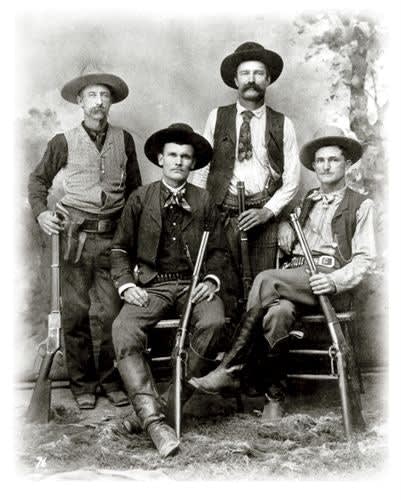If ever a law enforcement group brought to mind truth, justice and the American way, it's the Texas Rangers. Over the years, countless books, movies and television shows have depicted police agencies and their inner workings, with some portrayals less than flattering. To my recollection, the Texas Rangers have always been shown to represent what a bona fide law enforcement official is supposed to represent: honor, integrity, dedication and the ability to kick some serious butt should the need arise. (Remember Robert Duvall's Augustus T. McCall in "Lonesome Dove" and Chuck Norris's "Walker, Texas Ranger"?)
The late Col. Homer Garrison, Jr., longtime director of the Texas Department of Public Safety, once described Texas Rangers by saying, "They were men who could not be stampeded." And indeed, this proved to be true in the many tales that flourished from Ranger history, a history that dates back to 1823. They came into being when Stephen F. Austin, the father of Texas, obtained permission from the Mexican government to employ ten men to protect the 300 families who entered the territory of Texas (still a part of Mexico). Their orders began with the duty to "range" over wide areas to scout the movements of renegade Indians - and so was born the name of the Texas Ranger. These men earned $1.25 a day, and were responsible for furnishing their own weapons, horses and equipment.
As the oldest enforcement agency in North America with statewide jurisdiction, their history is dotted with numerous reorganizations and with more colorful stories than this short column could ever do justice. The Rangers not only fought Indians and Mexican bandits, they also became part of the Confederate Army during the Civil War, where they were known as a "Regiment of Rangers." They provided the backbone of homefront security, which operated on the "legal authority" of the pistols they wore on their hips or the rifle swinging from their saddles.
Rangers faced the challenge of bloody feuds, lynch mobs, cattle thieves, barbed wire fence cutters, killers and a hefty number of cowboys who were not fans of lawmen. Legend that the Rangers usually prevailed is backed up by these early stats for 1894-95, which show: the Rangers scouted 173,381 miles; made 676 arrests; returned 2,856 head of stolen livestock to the owners; assisted civil authorities 162 times; and guarded jails on 13 occasions. They battled bootleggers, armed bandits and border spies. (Former Texas Rangers Frank J. Hamer and B.M. Gault continued to put their Ranger expertise to work and went on to be part of the group that took down Bonnie and Clyde.)
In 1935, the Texas Rangers became part of the Texas Department of Safety (DPS) and for the first time in its history enjoyed the benefits of a state-of-the-art crime lab, improved communications and political stability.
More than 65 years later, the Texas Rangers are still making their mark by providing investigative assistance to federal, state and local law enforcement agencies, with assistance being reciprocated from DPS Special Crimes Division, the Department's Narcotics Service and the agency's Motor Vehicle Theft Service. During the past year (2000), they've been involved in 4,061 investigations; 1,140 felony arrests; and recovered almost $2 million worth of stolen property plus almost $2.5 million in contraband. Eleven death sentences and 42 life sentences have been handed down involving their past year's efforts.
The agency has also recently named a new chief, 25-year veteran C.J. Havrda, whose intention is "to see that the Rangers continue to perform their duties with the most qualified, dedicated and best-trained personnel."
You can rest assured, the modern Texas Ranger remains easily identified by his uniform - civilian clothes, western hat, western boots, and a badge that's still made from a Mexican coin pinned to the shirt above the left pocket.
Make you want to trade in your current uniform?
To learn more about the Texas Rangers and the full list of requirements to apply to become one visit http://www.texasranger.org
Texas Rangers At A Glance
Service Area: entire state of Texas
Sworn Officers: 107 total
87 white males
4 black males
13 Hispanic males
1 Asian male
1 white woman
1 black woman
Salary Range: $45,136 to $81,744
Special Requirements For Texas Rangers:
U.S. citizen, at least 21-years of age, excellent physical health, and must have an outstanding record of at least 8 years experience with a bona fide law enforcement agency. Applicant must currently be employed with the Texas Department of Public Safety.
Marce Hanson is a regular contributor to POLICE and a former police officer. She wouldn't mind putting on a uniform again if she could wear the cool Texas Ranger badge and buckle.











